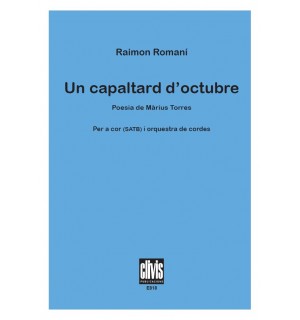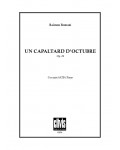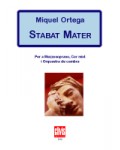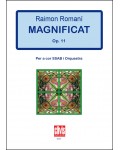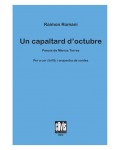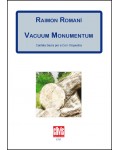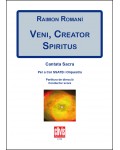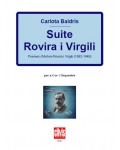
No products
Prices are tax included
Product successfully added to your shopping cart
There are 0 items in your cart. There is 1 item in your cart.
- English
- Castellano
- Català
Un capaltard d’octubre (Choro & String Orch.)
DE818
Un capaltard d’octubre (An October Evening) is a seven-minute work which expresses the gradual process of someone venturing confidently into the heart of nature in search of their inner world. The text comes from the first part of Tarda i Vespre (Afternoon and Evening), a poem in four sections written by Màrius Torres in 1941.
| Period | 20th c. |
| Instruments | choir SATB-Orchestra string |
| Text language | Catalan |
| Pages | 16 |
| Time | 7:30 min |
| Contents | score |
| ISMN | 979-0-3502-1123-2 |
| Remarks | The orchestra materials are available in rent regime. Contact with the publisher. |
| Price of print edition | 20 € |
| Others | Catalan text with Màrius Torres |
| Orchestras | si |
| Edition | Digital |
Un capaltard d’octubre (An October Evening) is a seven-minute work which expresses the gradual process of someone venturing confidently into the heart of nature in search of their inner world. The text comes from the first part of Tarda i Vespre (Afternoon and Evening), a poem in four sections written by Màrius Torres in 1941.
The opening bars are weighty and meditative; the traveller seems to be seeking peace in nature, but has a uneasiness that will not let him find calm. The music proceeds until in a tempo più mosso we reach a lyrical fragment that aims to express the exaltation of the poet’s spirit as he contemplates the landscape. The culmination of the speech comes with the phrase: “Ah, calma de l’espai, majestuosa i viva!” (Oh, the calm of the space, majestic and alive!) sung by the choir without instrumental accompaniment. A brief coda in a crescendo brings the work to a conclusion with the final philosophical remark: “Em sento fet per a un amor així” (I feel made for a love like this).

